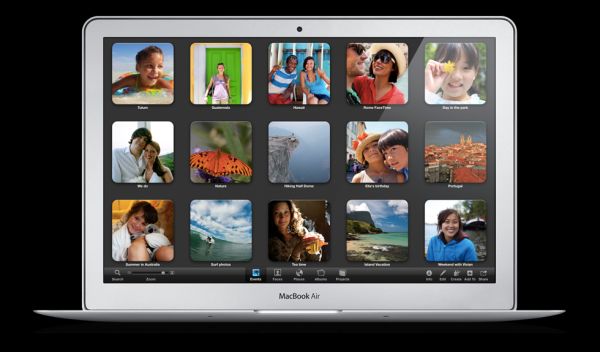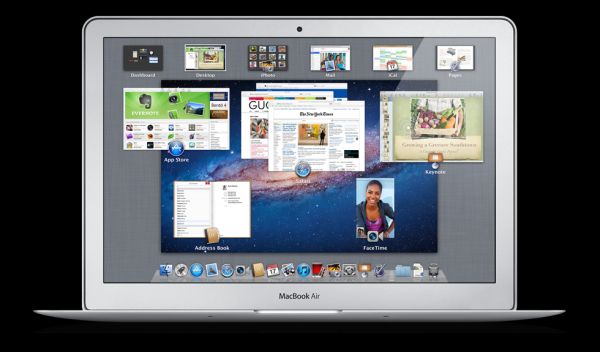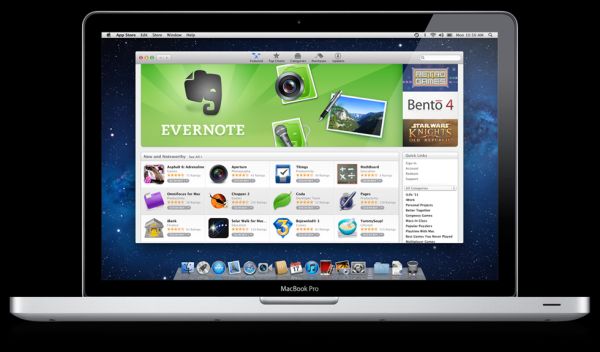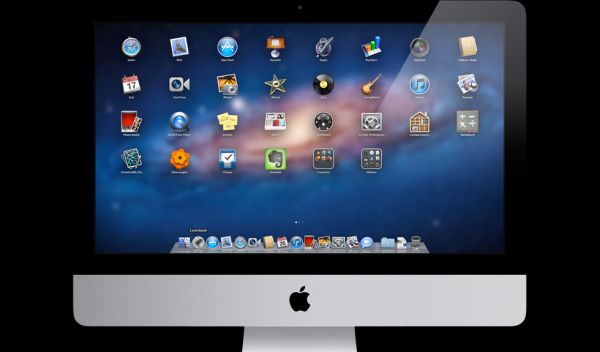WWDC 2011: OS X 10.7 Lion
by Andrew Cunningham on June 6, 2011 1:04 PM ESTMost of what was shown was stuff we'd seen before in other Apple demos of Lion, but I'll go through all of them for the sake of having all of this data collected into one place.
First, Lion brings new multitouch gestures to the table in an effort to replace mouse-heavy clicking and dragging behaviors. Scrolling, multitouch taps, pinching to zoom, and swiping through multiple photos, web pages, and fullscreen apps. Scrollbars, instead of standing by at all times to be clicked with a mouse, will appear and disappear as needed, as they do in iOS.
Apple has been equipping its Macs with the hardware to do this for awhile - most of its laptops sold since the unibody MacBook Pro refresh in late 2008 have included large, buttonless multitouch trackpads, and the Magic Trackpad introduced in mid-2010 (and offered as an option at no cost with the latest iMac refresh, reviewed here) brings the same functionality to the desktop.
Next, Lion gives developers standard methods for making fullscreen apps, which can run without all of those pixel-eating toolbars and title bars seen in the OS today. This should alleviate my own personal complaints about how much room the standard OS X title and menu bars take up in OS X, especially on the low-resolution screens found in their smaller notebooks.
Most of Apple's built-in programs are going to take advantage of the full-screen feature: this is a list that includes Safari, Mail, iCal, Preview, Photo Booth, iMovie, and iTunes, among others. Toggling between different apps in fullscreen mode and the OS X desktop is accomplished via the aforementioned multitouch gestures.
Apple has also added what it calls Mission Control to aid switching between apps - this feature is a natural extension of the Expose app switcher that first showed up in OS X 10.3. You can see all of your open windows (now grouped by app), as well as your different Spaces desktops and widgets. Fairly heavy Expose users will appreciate the extra organization, and this goes a long way toward making Spaces' multiple desktops manageable.
Next up is the Mac App Store, a Snow Leopard add-on that Apple is pushing extremely heavily in Lion - they boast that the App Store is already beating out brick-and-mortar stores like Wal-Mart and Best Buy in terms of units sold. In Lion, the App Store adds support for in-app purchasing, push notifications, and delta updates, meaning that users can download patches that are just patches, rather than a patched copy of the full app. No word on whether Snow Leopard users will be able to enjoy these features, but Apple doesn't habitually backport core OS features.
Apps purchased in the Mac App Store are automatically added to Launchpad, Apple's fancy-pants name for the iOS home screen that it has added to OS X. Apps in Launchpad can be organized and grouped just as they are in iOS - there's literally nothing new here if you've ever used anything running iOS 4.
Apple didn't mention whether programs installed via traditional means could be added to Launchpad - given how heavily they're pushing the App Store, I'm guessing that they won't allow it. It's in Apple's interest to make non-App Store programs feel like second-class citizens in the OS, even if they don't completely ban the installation of these programs. This gives consumers more reason to frequent the App Store and developers more reason to get their programs in the App Store. This sort of behavior makes me a bit uncomfortable, even though I can name a dozen people right off the top of my head who would be better off if they could only install approved software on their systems - the user is trading control for convenience, and it's up to the user to decide whether that's a trade they want to make.














42 Comments
View All Comments
dac7nco - Monday, June 6, 2011 - link
Most Mac users will use the new App Store exclusively. Want a different browser or mail client than Apple's approved ones? NIMBY!-Steve Jobs
MySchizoBuddy - Monday, June 6, 2011 - link
thats upto the users isn't it.PeteH - Monday, June 6, 2011 - link
It's not like downloading and installing software from a website is hard. If what you're saying is that technologically illiterate users will use the default browser and mail client, well, that's pretty much how things are now.mesiah - Tuesday, June 7, 2011 - link
Although you say that jokingly, I don't think it is beyond plausibility for a future version of the OS to disallow the installation of non-app store apps. They already do it with their other platforms, and now that they are moving everything to their app store, I think it is just a matter of time.Tros - Tuesday, June 7, 2011 - link
Same argument as PeteH:The most content users stay within the walled garden of iOS. The most attempts I've seen at preventing jailbreak are usually when it's a vector for a worm.
realmike15 - Tuesday, June 7, 2011 - link
I think Apple realizes people don't want restrictions, look at their DRM-free catalog of music. However, based on what we've seen from iOS it's plausible that they may someday try to restrict OS X to Apple approved software via the App Store. If that happens, that will be my last day as an Apple customer. Right now I'm a Desktop PC - Apple Laptop guy, and quite happy with that choice.It's possible that Microsoft and Apple might try to push an App Store only approach some day. But even if that day comes, I don't see Google or Linux adopting such a harsh policy. Stand behind the little guys if you want to prevent things like this from becoming the norm.
dananski - Friday, June 10, 2011 - link
How would they differentiate between non-app store apps and programs people are developing themselves? I've read that you have to pay $100 to install your own iphone app on a physical iphone (which is why most software developers go for other phones). Surely Apple won't want to put people off writing programs on their Macs with a similar policy?Penti - Wednesday, June 8, 2011 - link
You already have other browsers in the Mac App Store. Why would most mac users even use it. It might be their only channel to buy software (not games)! But not the only channel for their software.burntham77 - Friday, June 10, 2011 - link
I use Safari on my iMac at work and I hate it. It's just not reliable. Firefox is still my favorite.Micheal Summers - Thursday, July 7, 2011 - link
This is suppose to be a upgrade yet the articles i have read about it doesn't really offers anything new. Read this article http://v12ntoday.com/news/news-news/apple-os-x-lio... and tell me if you find anything special about it.